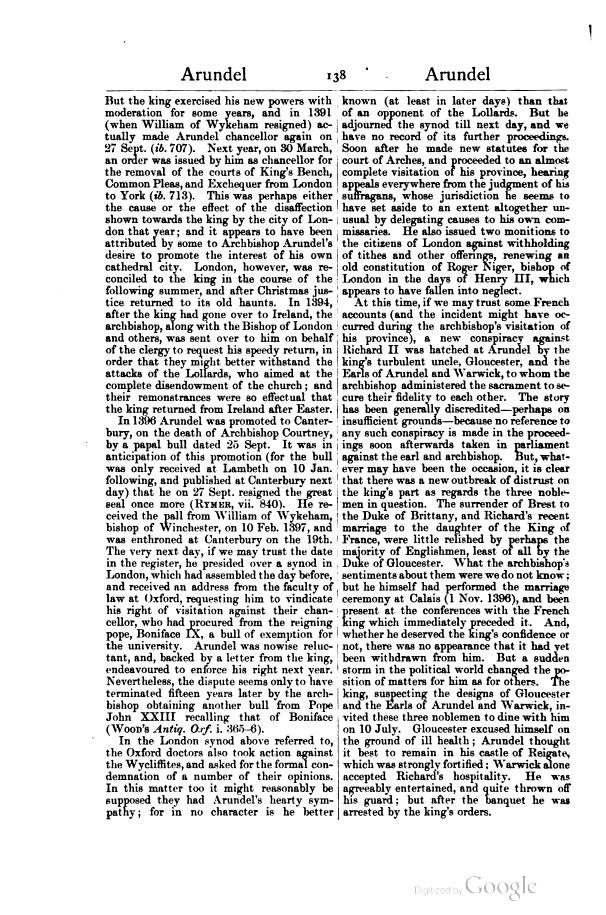But the king exercised his new powers with moderation for some years, and in 1391 (when William of Wykeham resigned) actually made Arundel chancellor again on 27 Sept. (ib. 707). Next year, on 30 March, an order was issued by him as chancellor for the removal of the courts of King's Bench, Common Pleas, and Exchequer from London to York (ib. 713). This was perhaps either the cause or the effect of the disaffection shown towards the king by the city of London that year; and it appears to have been attributed by some to Archbishop Arundel's desire to promote the interest of his own cathedral city. London, however, was reconciled to the king in the course of the following summer, and after Christmas justice returned to its old haunts. In 1394, after the king had gone over to Ireland, the archbishop, along with the Bishop of London and others, was sent over to him on behalf of the clergy to request his speedy return, in order that they might better withstand the attacks of the Lollards, who aimed at the complete disendowment of the church; and their remonstrances were so effectual that the king returned from Ireland after Easter.
In 1396 Arundel was promoted to Canterbury, on the death of Archbishop Courtney, by a papal bull dated 25 Sept. It was in anticipation of this promotion (for the bull was only received at Lambeth on 10 Jan. following, and published at Canterbury next day) that he on 27 Sept. resigned the great seal once more (Rymer, vii. 840). He received the pall from William of Wykeham, bishop of Winchester, on 10 Feb. 1397, and was enthroned at Canterbury on the 19th, The very next day, if we may trust the date in the register, he presided over a synod in London, which had assembled the day before, and received an address from the faculty of law at Oxford, requesting him to vindicate his right of visitation against their chancellor, who had procured from the reigning pope, Boniface IX, a bull of exemption for the university. Arundel was nowise reluctant, and, backed by a letter from the king, endeavoured to enforce his right next year. Nevertheless, the dispute seems only to have terminated fifteen years later by the archbishop obtaining another bull from Pope John XXIII recalling that of Boniface (Wood's Antiq. Oxf. i. 365-6).
In the London synod above referred to, the Oxford doctors also took action against the Wycliffites, and asked for the formal condemnation of a number of their opinions. In this matter too it might reasonably be supposed they had Arundel's hearty sympathy; for in no character is he better known (at least in later days) than that of an opponent of the Lollards. But he adjourned the synod till next day, and we have no record of its further proceedings. Soon after he made new statutes for the court of Arches, and proceeded to an almost complete visitation of his province, hearing appeals everywhere from the judgment of his suffragans, whose juiisdiction he seems to have set aside to an extent altogether unusual by delegating causes to his own commissaries. He also issued two monitions to the citizens of London against withholding of tithes and other offerings, renewing an old constitution of Roger Niger, bishop of London in the days of Henry III, which appears to have fallen into neglect.
At this time, if we may trust some French accounts (and the incident might have occurred during the archbishop's visitation of his province), a new conspiracy against Richard II was hatched at Arundel by the king's turbulent uncle, Gloucester, and the Earls of Arundel and Warwick, to whom the archbishop administered the sacrament to secure their fidelity to each other. The story has been generally discredited — perhaps on insufficient grounds — because no reference to any such conspiracy is made in the proceedings soon afterwards taken in parliament against the earl and archbishop. But, whatever may have been the occasion, it is clear that there was a new outbreak of distrust on the king's part as regards the three noblemen in question. The surrender of Brest to the Duke of Brittany, and Richard's recent marriage to the daughter of the King of France, were little relished by perhaps the majority of Englishmen, least of all by the Duke of Gloucester. What the archbishop's sentiments about them were we do not know; but he himself had performed the marriage ceremony at Calais (1 Nov. 1396), and been present at the conferences with the French king which immediately preceded it. And, whether he deserved the king's confidence or not, there was no appearance that it had yet been withdrawn from him. But a sudden storm in the political world changed the position of matters for him as for others. The king, suspecting the designs of Gloucester and the Pearls of Arundel and Warwick, invited these three noblemen to dine with him on 10 July. Gloucester excused himself on the ground of ill health; Arundel thought it best to remain in his castle of Reigate, which was strongly fortified; Warwick alone accepted Richard's hospitality. He was agreeably entertained, and quite thrown off his guard; but after the banquet he was arrested by the king's orders.
